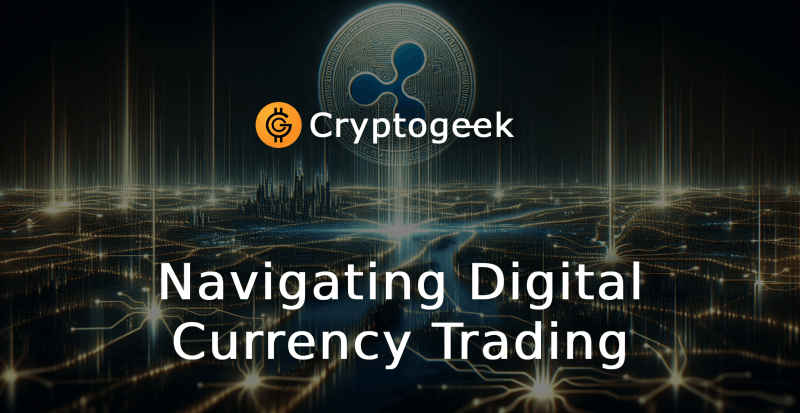Navigating Digital Currency Trading: A Beginner's Voyage Into Buying Bitcoin


As cryptocurrencies continue to dominate news headlines seemingly every day, anyone still unfamiliar with digital currencies might feel as though they're late to a party. But they shouldn't fear, because diving into the crypto space is still within reach, and the first port of call might just be to buy Bitcoin.
As the flagship of digital currencies, it stands as a beacon for eager new investors looking to navigate this exciting and somewhat uncharted territory. But where does a person begin? It's not like there's a one-stop-shop where they can pick up a bitcoin or two. Well, actually, in the virtual sense, there is.
Contents
- Understanding what Bitcoin is and its place in digital currency
- Evaluating the right time to make a first Bitcoin purchase
- Secure digital treasures: safeguarding cryptocurrency investments
- The evolution of digital marketplaces: the transition from tangible trades to virtual assets
- Decoding the digital wallet: mastering the art of cryptocurrency management
- Tech trends: the role of cutting-edge platforms in the crypto trading renaissance
Understanding what Bitcoin is and its place in digital currency
Before a person sets sail on a crypto journey or decides to buy Bitcoin, it's essential for them to understand the vessel they'll be voyaging with. Bitcoin is more than just a piece of digital gold that everyone's rushing to mine; it's also a decentralized currency that operates free of traditional bank oversight.
That means it's underpinned by a technology called blockchain that records every transaction in a way that's transparent and nearly impossible to manipulate. This unique selling point has made bitcoin a popular choice for tech enthusiasts, investors and even everyday folks looking to dip their toes into the waters of digital finance.
Evaluating the right time to make a first Bitcoin purchase
How does a person decide when to buy Bitcoin? Timing the market can be tricky, whether a person is dealing with stocks, bonds or cryptocurrencies. Common thoughts might lead them to wait for a dip, but in reality, the best time could be as soon as they're ready and they've done their research. It's like finding the perfect wave to ride; all a person needs is patience and knowledge to recognize it.
Secure digital treasures: safeguarding cryptocurrency investments
When a person has secured a foothold in this new world, the last thing they'll want is to lose their digital loot to pirates. In the realm of digital currency, security is the armory that will defend a person's assets against virtual attacks. This is why it's a good idea to check if a chosen trading platform champions two-factor authentication, has top-notch encryption and stores the majority of assets in cold storage – meaning they're kept offline and away from potential hacker's clutches.
While searching for a secure exchange, dig deeper into what makes a platform less susceptible to the online equivalent of choppy seas. Are their security credentials up to date? Do they have a responsive support team should the worst happen? And how do they fare on the open forums where users share their experiences? These are the battlements that fortify a platform's stronghold, and they're what will keep cryptocurrency secure as a person learns the ropes to become a seasoned seafarer of the digital markets.
The evolution of digital marketplaces: the transition from tangible trades to virtual assets
The culture shock from trading tangible stocks to dealing in virtual assets can be compared to swapping a physical compass for a digital one. Traditional stock exchanges operate during set hours, and there's a palpable sense of things being finite. In contrast, digital marketplaces are by nature always open, global and operate 24/7. Blockchain technology means the past, present and future of every unit is traceable, creating a continuous ledger of all transactions – a concept that's steering the entire world into a new era of trading.
Decoding the digital wallet: mastering the art of cryptocurrency management
Part of a journey into digital currency trading involves mastering the digital wallet – think of it as learning how to navigate using the stars instead of a paper map. A digital wallet is where a person stores their Bitcoins; it can live on a desktop, a mobile device or even on hardware disconnected from the internet.
With a little exploration and understanding, a digital wallet transforms from a mystery box into a powerful tool, ready to unlock the full potential of a new cryptocurrency journey. Setting one up is straightforward, but individuals must remember to keep its password completely safe and secure.
Tech trends: the role of cutting-edge platforms in the crypto trading renaissance
As the finance world sails towards the horizon, cutting-edge technologies are reshaping the landscape of digital currency trading. User-friendly interfaces are becoming the norm, welcoming newcomers who might find the concept daunting. Further down the line, artificial intelligence may start to predict market trends, making the seas either more navigable or more unpredictable. Only time will tell.
Beyond trading, modern platforms are incubators for innovation, integrating DeFi protocols and NFT capabilities and blurring the lines between traditional finance and the burgeoning crypto ecosystem. These advancements aren't just bells and whistles, they're democratizing access, lowering barriers to entry and fostering a more inclusive and informed investment environment.

Top Tutorials
-
Что такое хард-форк? Подробный гайд для новичковJul 27, 2020
-
Стейкинг на Ethereum 2.0 и его основные особенностиAug 01, 2020
-
Инновации на основе блокчейна в сфере энергетикиAug 03, 2020






Hier sind noch keine Kommentare. Sei der Erste!